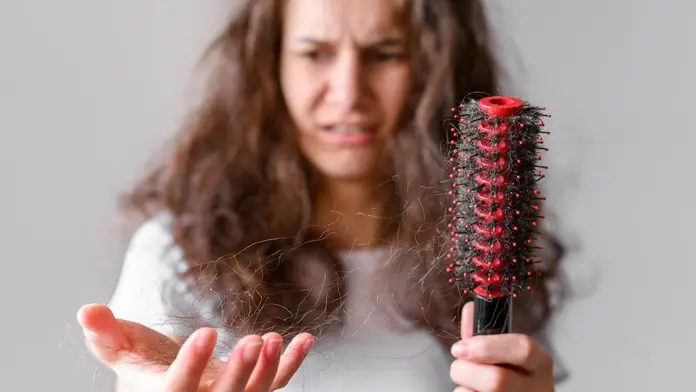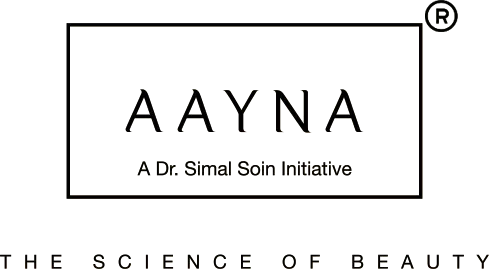Calcium is a mineral that is essential to strengthen your bones and teeth. You’ve certainly heard about the most well-known benefits of this essential mineral since you were a child, but how much do you know about its other beneficial effects? Does calcium also help in hair growth, or can calcium deficiency cause hair loss, for instance? Read on to find out more about the wonders of calcium, and the role it plays in keeping your locks shiny and strong.
Risk Factor
When you’re losing hair, it’s critical to understand why, so you can stop losing it. To address these issues, a hair loss treatment at AAYNA can help you regrow natural hair and keep current hair on the scalp by making them more potent with each session.
Role Of Calcium & How it is Linked to Our Hair
If you are concerned about hair loss or are beginning to notice indications of it, you should inquire about calcium and other minerals and how they may affect your hair development.
After all, who wouldn’t want to prevent hair fall due to calcium deficiency in the first place with a simple supplement or a calcium-rich diet?
Unfortunately, it is not always so simple and straightforward. Your daily calcium consumption is pertinent to the health of your hair and its continual, healthy development. Calcium is one of the most essential nutrients for optimal bodily growth, reproduction, and maintenance.
A study indicated that decreasing levels of calcium in diet retention and calcium deficiency, in general, may be the reasons for hair loss in women as people age. According to the study, hair loss in women is more prevalent due to deficiency as they age due to the effects of cycles of menstruation and menopause on calcium levels. (Even women who aren’t going through menopause will nonetheless observe steady declines throughout the course of their lives).
Calcium shortage occurs more frequently than we may believe. When the calcium in the blood begins to deplete, people experience what is known as low calcium symptoms.
Hair loss due to calcium deficiency is a very common cause of hair loss, although very few people pay attention to it. A lack of important minerals, particularly calcium, will cause an imbalance in our bodies, affecting hair health and causing low calcium hair loss. Although it is critical to understand the benefits of calcium for hair, it is also critical to understand the risks of calcium deficiency.
9 Facts about Lack of Calcium
1) Calcium supplementation aids iron absorption
A proper level of iron for hair growth is required by our bodies to develop lovely and healthy strands of hair. Iron is an essential nutrient that is stored in various places in our bodies and it can be detected in hair follicles. During menstruation, many women are more likely to suffer from iron deficiency.
Inadequate ferritin (iron) levels in the body might exhibit calcium deficiency symptoms hair loss, sluggish regrowth, and weaker and brittle hair being the most common ones.
It goes beyond mentioning that increasing calcium consumption in conjunction with a vitamin C and D-rich (diet can improve iron absorption.) However, because everyone is different, it is best to speak with your doctor to determine the hair loss vitamin deficiency underlying causes and the appropriate dosage for your body.
2) The amount of calcium necessary changes with time
As a lack of calcium cause hair loss, it is critical to ensure that you obtain enough calcium over time. You will get thicker and fuller hair and your hair growth will be faster if you consume enough calcium. Each individual has a unique intake need. The average teenager requires approximately 1,800 mg of calcium per day, whereas adults require approximately 1,200 mg. Adults over the age of 50 require a daily calcium intake of 1,200 mg, as this is when most women begin to notice hair thinning.
Although calcium is found in foods such as milk, vegetables, and yogurt, meeting the required daily dose of 1,000 to 1,200 milligrams remains a struggle. This is where vitamins can help. Because there are numerous products on the market that can aid with hair development, you may want to consider prenatal vitamins, which are high in calcium. However, as usual, a little research before making your purchase can go a far way.
You should also search for pills that contain both iron and biotin, as both are important minerals for hair development. Adding these supplements into your everyday life will not only assist you in achieving your goals, but it would also allow you to keep your present diet without making major adjustments.
3) Caffeine inhibits calcium absorption
This may be terrible news for you because you may need to limit your coffee use in order to stop losing hair. Caffeine (especially chocolate) is known to deplete the body’s calcium stores.
Consuming calcium-rich foods such as vegetables, salmon, and almonds may not give you the rush that coffee does, but it does allow your body to sustain energy throughout the day. For a healthier diet, it is necessary to be aware of calcium-rich foods. You might try adding milk to your coffee. Milk contains calcium, which can help mitigate the calcium-blocking effects of coffee.
4) Silica – maintains calcium levels while improving hair texture and development
Many men and women use silica to grow thicker, healthier hair. Because silica helps regulate the calcium and magnesium levels in our systems, it aids in the regulation of hormones. Hormone control can assist promote hair growth and health.
Aside from that, silica alkalizes our bodies’ systems, which aids in disease resistance. The easiest strategy to compensate for silica shortages is to take supplements, which come in a variety of forms. Vegetables contain silica, so eat your veggies for healthier hair development.
5) Calcium and Hormonal Imbalances Affect Hair Growth
Calcium regulates hormones, and hormonal abnormalities can contribute to calcium deficiency hair loss. Calcium is essential for strong, healthy hair because it aids in hormone release, especially androgen hormones such as estrogen, testosterone, and DHT (the major hormone responsible for hair loss). Calcium is also implicated in the hormone-enzyme release of biotin enzymes, which are essential for good hair development.
6) Calcium is useful for more than just bones
We’ve all heard that calcium is healthy for your bones, but now you know how calcium deficiency and hair loss are correlated. Having adequate calcium in your bloodstream is necessary for good hair. Dry hair is one of the most common symptoms of a calcium shortage, demonstrating that calcium is required in our bodies for healthy hair.
Your hair will appear fuller and healthier as it develops. The more healthy your hair is, the less likely it is to break and fall out. We know that calcium deficiency causes hair fall, but dry skin, brittle nails, damaged tooth enamel, and aching joints are among the non-hair-loss symptoms of a calcium deficit.
Calcium can be found in milk, cheese, spinach, and a variety of other foods. Many supplements are available to help you boost your calcium intake and reduce hair dryness.
7) Calcium Affects Other Nutrient Absorption
Hair health is dependent on a range of nutrients, including vitamins that cause hair loss, (like biotin and vitamin C and D), minerals (such as iron and zinc), and proteins. Vitamin D levels must be adequate for calcium absorption. Because vitamin D aids the body’s absorption and utilization of calcium, a vitamin D shortage might contribute to calcium inadequacy indirectly causing hair loss female vitamin deficiency. A healthy diet containing these nutrients, as well as calcium-rich foods, promotes general hair health.
8) Nutritional shortages
Severe nutritional shortages, such as calcium inadequacy, might indirectly contribute to hair loss. Early-stage calcium insufficiency frequently goes undetected. Muscle cramps, brittle nails, dry skin, tooth decay, weakening bones, and, in severe cases, osteoporosis are common symptoms as the deficit worsens. Inadequate nutrient consumption can cause general health problems, which can affect hair growth and hair health.
9) Calcium deficiency side effects
Low calcium levels increase your risk of developing general disorders. If your body is deprived of calcium for an extended period of time, it will begin to hunt for calcium reserves before removing it from your bones.
Not getting enough calcium will cause low calcium cause hair loss over time, but there may also be other major consequences. However, hair loss may be a real indication that calcium is being pulled from body reserves in order to maintain correct blood calcium levels. Calcium levels in our blood should be adequate since they aid in muscle function and blood vessel formation.
Takeaway
It cannot be stressed enough that maintaining adequate levels of calcium, along with other nutrients, is important for promoting healthy hair growth. So if you are concerned that you’re not getting enough calcium for your body, it’s time to eat extra calcium-rich foods like fish, almonds, dairy products, and dark leafy green vegetables. Adding supplements to your daily routine might also help you maintain appropriate calcium levels. If you stick to this diet long enough, you will be rewarded.
And with a little help from AAYNA, you can identify the underlying reason for your hair loss and develop a suitable hair loss treatment strategy,
The team of skilled dermatologists and cosmetologists at AAYNA can provide a personalized assessment, recommend appropriate therapies, and provide a customized treatment plan for you to get luscious hair and a healthier body in no time.
Frequently Asked Questions
1. What exactly is Biotin Deficiency?
One of the most prevalent causes of hair loss is a biotin deficiency. This crucial nutrient encourages keratin development and helps to maintain the strength of your hair, skin, and nails. It can be found in fortified grains and numerous vegetables and fruits, but it can also be obtained through a biotin supplement.
2. What role does calcium have in healthy hair growth?
Calcium is engaged in a variety of physiological processes that promote healthy hair development. It is involved in cell signaling as well as the regulation of many enzymes and hormones, including those involved in hair follicle formation and cycling. Calcium levels that are adequate enhance the functioning of hair follicles and encourage their growth and maintenance.
3. Can Calcium Tablets Prevent Hair Loss?
Taking calcium supplements may not result in a significant gain in hair growth, particularly if calcium insufficiency is not the root cause of loss of hair or hair thinning. Hair growth is a complicated process that is controlled by a variety of factors, including factors like heredity, hormone balance, and general nutritional health. While calcium is crucial for hair health, a well-balanced diet that includes sufficient amounts of it, as well as other necessary minerals, is recommended for maximum hair growth.
4. Is calcium directly responsible for hair growth?
While calcium may not directly stimulate hair development, it does contribute to the overall health and function of hair follicles. Calcium maintains the structural integrity of hair follicles and aids in the maintenance of healthy cell division and differentiation, both of which are required for hair development.


